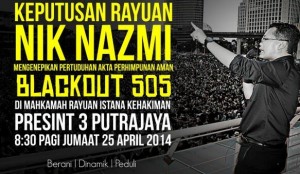SHAH ALAM, 27 Apr: The Malaysian Bar has commended the three Court of Appeal judges for writing separate judgments in declaring a provision under the Peaceful Assembly Act (PAA) as unconstitutional yesterday.
The President of the Malaysian Bar Council, Christopher Leong, said it was always important, particularly in constitutional issues, that each member of the Bench fully addressed his own minds to the issue and have his own articulation as to the reasoning for his decision.
Leong said the Bar agreed that section 9(5) of the PAA is unconstitutional as it made it an offence for failing to give a 10-day notice to the police before holding a meeting.
“We also agree that Section 9(1) of the PAA is constitutional as it required a rally organiser to give 10 days notice to the police,” he said in a press statement.
Leong said the Bar had always maintained the position that Article 10 of the Federal Constitution guaranteed the rights of peaceful assembly and of expression.
“hese rights must necessarily include the right to protest, whether at a fixed or designated place or by way of a procession.
“The proviso in Article 10(2)(b) cannot be construed or applied to defeat these fundamental rights,” he said.
He added the proviso only allowed the authorities to impose such restrictions as necessary or expedient in the interests of national security.
He said the authorities would take measures to facilitate all peaceful assemblies and in doing so, may impose only such restrictions as are necessary to address a particular public order issue.
Leong said it was to be noted that an assembly which was violent or intended to be violent did not in the first place qualify as a right guaranteed under Article 10(1) as a peaceful assembly.
“Section 9(1) of the PAA on the 10-day notice period ought to be read in light of the above constitutional provisions to provide the police with sufficient time to consider, plan and implement measures to facilitate a peaceful assembly,” he said.
He also said the constitution, the PAA and the Court of Appeal did not recognise non-peaceful assembly as a right and action may be taken under the Penal Code.
Recently, in acquitting the Selangor legislative assembly deputy speaker Nik Nazmi Nik Ahmad of a charge of not giving 10 days’ notice of a rally, the appellate court judges affirmed the fundamental right of citizens to assemble peacefully.
Nik Nazmi, who is also Seri Setia state assemblyman, was charged under the Peaceful Assembly Act for not giving notice to hold the Blackout Rally at the Stadium Kelana Jaya last year, in the aftermath of the general election.
Nik Nazmi ran the risk of being fined up to RM10,000 and if convicted, faced the prospect of being disqualified from public office.
The appellate court judges yesterday said it was ironic to declare a peaceful assembly illegal as this was not stated in the PAA.
The landmark ruling of Judges Datuk Mohd Arif Mohd Yusof, Datuk Mah Weng Kwai and Datuk Hamid Sultan Abu Backer will be made available on Monday.
All three were practising lawyers before they were elevated to the bench.
Members of the legal fraternity also praised the move by the three appellate court judges to deliver separate judgments.





